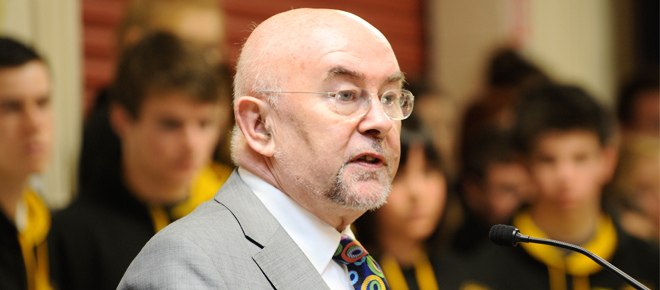
Ireland’s universities have launched a campaign calling on Education Minister Ruairi Quinn to raise student fees if he will not allocate further exchequer funding to the cash-strapped third-level sector.
Union of Students in Ireland President Joe O’Connor has termed the situation currently facing Minister Quinn as “the biggest third-level policy decision since Niamh Breathnach introduced the ‘free fees’ scheme back in 1999”.
Public funding for third-level has been reduced in consecutive budgetary cutbacks, despite an overall rise in the numbers of students attending.
Addressing students gathered at a Class Representative Council meeting last November, DCU President Briain MacCraith revealed that the university was “struggling in every possible way… to ensure we preserve some quality”.
Eager to establish how much additional funding universities require, the Higher Education Authority has instructed universities to provide them with a breakdown of institute spending and budgets. Students’ Union President Aaron Clogher doesn’t believe, however, that there will be any immediate changes made.
Calls for a possible fees hike come in a year which has seen a steep rise in the number of students seeking financial assistance from their universities to help them complete their studies.
The student registration fee, for those not in receipt of a grant, is already set to rise by €250 to €3,000 in September 2015.
If full fees were introduced in 2016, students and families could be burdened with at least an additional €3,000 – €4,000 a year, depending on the course studied.
A survey conducted by the Irish League of Credit Unions in August 2013 identified the total monthly cost of going to college, for those who live away from home, as €950.
Unable at present to cover costs which include rent, utility bills and food, several students have turned to the Student Assistance Funds (SAF) in their third-level institutes for help.
The Government allocate this funding from the European Social Fund to Irish universities. As of late October 2013, some 700 students had applied for DCU’s SAF, a 40 per cent rise on figures for the same period last year.
Trinity College Dublin’s SAF and Student Hardship Fund for this academic year were both depleted by last October, while Dublin Institute of Technology are currently fundraising for students experiencing hardship as their SAF ran dry in November.
Making matters more complicated for some, Student Universal Support Ireland (SUSI) last month sought to recover grants awarded in error to dozens of postgraduate students for the 2012 / 2013 academic year.
As of December 28th 2013, DCU was owed €460,000 by students who were unable to graduate due to outstanding fees.
The university encourage all students experiencing hardship to engage with the support services available to them.
Failure to do so can result in the student being blocked from graduating, but a spokesperson said the numbers this applies to “would be very low single figures and is a last resort”.
Sarah Bermingham
Image Credit: The Labour Party




Leave a Reply